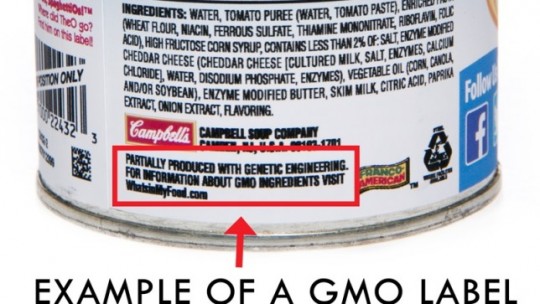
Big Corn, Big Lies
- Big Corn releases new study full of labelling and cost exaggerations
- GMO labelling will allegedly cost American families $1,050 annually, but one proactive company proves this to be wrong
- The DARK Act is back! Do your part to stop it!
Dear Reader,
Big Corn is back at it…
But this time they aren’t just filling our food supply with garbage food — they are now filling our news streams with garbage science.
What’s even more frightening…
The Dark Act is back in the Senate. If Big Corn gets their way and the act passes, our food supply will continue to be an endless stream of unlabeled GMO products.
But this doesn’t have to be the case. You have the power to stand up to Big Corn’s agenda.
Below I explain the lies… and what you can do about it.
![]() A Garbage Study
A Garbage Study
A new study funded by Big Corn — the same folks who call high fructose corn syrup natural — claims labelling food containing GMO ingredients will cost the foods industry a shocking $81.9 billion.1
In fact, Big Corn goes on to report that when Vermont’s new GMO labelling law goes into effect on July 1, it will cost each American family an additional $1,050 annually and increase average national food prices by 1.76 percent in the first year.1
But what Big Corn doesn’t tout as loudly is the flaws in their study.
Let me explain…
This “study” makes grandiose assumptions about how the food industry will react to the new GMO labelling law.
Instead of calculating the minute costs of adding new text to food packaging, Big Corn hypothesizes that all food makers, regardless of their sales territories or location, will instead reformulate their products using non-GMO ingredients so they can sell them as non-GMO foods in Vermont.
These reformulation costs are how the corn industry came to the inflated conclusion that American families will lose $1,050 from their budgets in coming years.
One American food giant has already debunked this bloated figure. We will explore how they did this in a bit.
First, let’s take a closer look at the inflated claims Big Corn is making about GMO labelling.
![]() The Big Corn Way: Labelling Lies as Facts
The Big Corn Way: Labelling Lies as Facts
The authors of the study claim this reformulation is due to consumers being less likely to purchase a product containing GMO ingredients.
However, there is research to combat Big Corn’s ridiculous claim.
A recent study by two U.S. Department of Agriculture economists shows that food choices at the grocery store are just as impulsive in countries requiring food labelling. It went on to report factors like price and calorie content were of more importance.2
Another study done by two agricultural economists found that the presence of GMO labels didn’t increase consumer apprehension toward GMO products. In fact, one of the key findings of the study was, “There was no consistent statistically significant difference in the average level of concern for GMOs expressed by people shown different labels. That is, the mere presence of the GMO label did not lead to a greater level of concern about GMOs.3
In addition to these American findings, Brazil’s GMO labelling policy provides interesting information. The “transgenic” symbol was added to Brazil’s GMO food packaging 15 years ago (2001), yet studies find that consumers are more apt to buy foods in packaging containing this label than those that do not contain the label, particularly if they make nutritional claims. 4

Brazil’s transgenic symbol Photo credit: www.loc.gov
Big Corn goes on to claim that many food producers will opt to make two versions of their products — one that contains GMO ingredients and a non-GMO ingredient version. This two-version production model is also a factor in their outrageous $81.9 billion estimate.
However, Vermont’s law only requires GMO products to have a label, not to make changes to ingredients.
And as we have recently seen with Campbell’s Soup, multiple products are a very unlikely reality.
Campbell’s has not reformulated all of their products. Instead, they now indicate which products contain GMO ingredients.

Campbell’s Soup GMO labelling
Photo Credit: abcnews.go.com
And according to company spokesman Tom Hushen, Campbell’s decision to label has made no difference in cost to the consumer. He explains:
“To be clear, there will be no price increase as a result of Vermont or national GMO labeling for Campbell products.”5
So there you have it. Campbell’s has proven there is no $81.9 billion problem. They are proactively labelling GMO products, and yet there is no price increase for the consumer.
While Campbell’s is certainly a trailblazer in the food industry, unfortunately, they still don’t see GMO products as harmful. Hushen went on to report, “We still believe GMOs are safe and we continue to believe that they play an important role in feeding the world.”
While Campbell’s opinions about GMOs may differ from those of the Living Well team, we can still applaud them for their transparency about their ingredients and consumer costs, even if these actions are the result of consumer demand.
If food ingredients are of importance to you, oppose the Senate version of the “DARK” (Deny Americans the Right to Know Act) Act NOW!
The DARK Act will:
- Pre-empt states from requiring GMO labelling
- Make voluntary labelling of GMO products more difficult for companies like Campbell’s
- Remove the FDA’s jurisdiction over GMO disclosures.
If you would like to oppose the Dark Act, you can call your senators at the U.S. Capitol switchboard (202) 224-3121. Let them know you oppose the DARK Act and support GMO labelling!
You can also use the form at Environmental Working Group. They are a non-profit, non-partisan organization dedicated to protecting human health and the environment. Click here to access the form.
If you have any comments about GMO labelling or the DARK Act, drop me a line! Nmoore@lfb.org
Live well,

Natalie Moore
Managing editor, Living Well Daily
Sources
[1] Cost Impact of Vermont’s GMO Labeling Law on Consumers Nationwide
[2] Corn Lobby’s GMO Labeling Study “Preposterous”
[3] Chapter 11 The Effect of GM Labeling Regime on Market Outcomes
[4] Brazilians Don’t Turn Up Their Noses At GE Food
[5] Campbell’s Decision to Label GMOs Destroys Monsanto’s Main Argument Against Labeling
Written By Natalie Moore
Natalie Moore is a dedicated health researcher with a passion for finding healthy, natural, and science-based solutions. After a decade of direct healthcare experience in western and natural medicine, she was involved in public health research before joining Living Well Daily.
View More Free Articles
Why Your Muscles Are Your Brain's Best Defense
Forget expensive brain scans and head-scratching cognitive tests that make you feel like you’re back in school. Japanese researchers have stumbled onto something that could change how we screen for memory problems—and it’s so simple, you’ll wonder why nobody thought of it sooner. A quick, painless measurement you can get during a routine checkup might...
Four Carbs that Could Add YEARS to Your Life
You’ve likely been avoiding carbs like the plague. Health gurus, fitness influencers, and diet books have convinced you that carbs are the enemy—that they spike your blood sugar, pack on pounds, and fast-track you to diabetes. So you’ve eliminated bread, sworn off pasta, and feel guilty just touching a piece of fruit. But what if...
Upgrade from Bananas and Apples to These Powerhouse Fruits
I’m often asked which fruits are the best. So, let’s talk about it. I’ll cut right to the chase: berries win this contest hands down. If you’re limiting your options to apples and bananas, you’re missing out on a universe of superior antioxidant power. Those everyday fruits are like bringing a knife to a gunfight...
The REAL Reason Americans are Getting “Fatter”
You’ve heard it a thousand times: “Americans are getting fatter because we’re lazy.” We sit at desks all day. We binge-watch Netflix instead of hitting the gym. We’ve traded physical labor for sedentary lifestyles. It’s a tidy explanation for why obesity has skyrocketed in developed countries. There’s just one problem—it’s completely wrong… A groundbreaking Duke...
Mailbag: Room Won't Stop Spinning? Do THIS First
“I’m dealing with vertigo issues, lightheadedness, and dizziness. As recently as this last Saturday I had multiple occurrences throughout the day. Is there anything I can do for this? I’m 69 and in good health. I work out 4 to 5 times a week.” —Spinning Hi Spinning, When patients approach me with similar complaints, I...
Hidden Number Secretly Sabotages Male Performance
Guys (and gals that love them), we should talk. You know how we’ve always been told that bedroom troubles are just part of getting older—that we just need to live with them? Well, it turns out that’s not true. Scientists recently wrapped up a six-year study that followed over 100 healthy men, and the findings...
Shocking Study Links Kids' Snacks to Dangerous Early Puberty
Kids are growing up in a world vastly different from the one we knew. Back in our day, if a child wanted something sweet, it was a piece of candy or a homemade cookie. Today’s kids are surrounded by products filled with artificial sweeteners that didn’t even exist when we were raising our own children....
Outdated Vitamin Guidelines Put Your Brain at Risk
If you’re like most people, you probably don’t think twice about vitamin B12—until your doctor mentions it during a routine blood test. But new research published in the Annals of Neurology suggests we need to pay closer attention to this crucial nutrient—especially as we age. Turns out, current guidelines for this essential nutrient might be...
The TRUTH About Supplement "Liver Dangers" REVEALED
There’s been a lot of buzz lately about liver damage from supplements—so, let’s talk about it. Reports of supplement-induced liver injuries have some folks wondering, “Could my natural remedy actually be harming me?” But before you toss all your supplements in the trash, let’s separate fact from fear—and talk about how to use supplements safely....
The 10,000 Steps LIE That's Ruining Your Health
I’ll be honest—I’m a little sick of the 10,000-steps theory. You know, the one that insists you need to take at least that many steps daily to stay healthy? You won’t believe where that claim originally came from. The 10,000-steps theory wasn’t handed down from the fitness gods on stone tablets. It originated from a...









